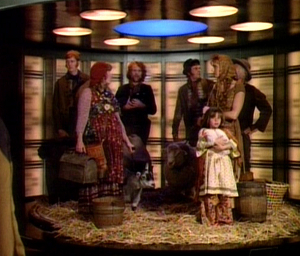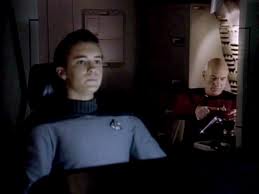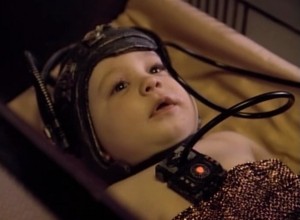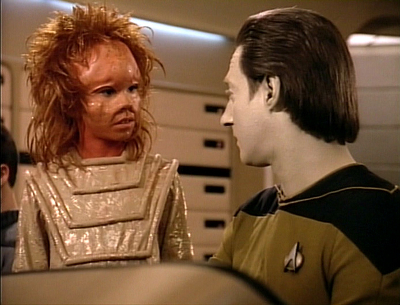I’m examining the impact Star Trek: The Next Generation had on my formation. The introduction to this series can be seen here.
The Enterprise juggles two long separated colonies: one agrarian community who hitches a ride on board, and another more technologically advanced civilization with a secret.
If you can enjoy the kind of silliness that has Captain Picard nonplussed at having chickens on his ship, and Riker bedding down alien Irish lasses, then this may be a fun episode for you. As a kid, I found it a smidge embarrassing; as an adult, the Irish stereotypes wear thin.
 The reason I write about it here is that unquestionable taboos and heresies really intrigue me. As many times as Star Trek might have given me an opportunity to question my assumptions, it’s still written by humans, with certain values they won’t question and certain gaps in their self-analysis. Here, the issue is cloning. The second colony, comprised of scientists with great technology in tow, survived early devastating losses of population by cloning themselves and have in fact developed a distaste for sexual reproduction. They ask the Enterprise crew to donate DNA for cloning to help the colony survive certain survival-threatening limitations they’ve run into. Picard and company flat out refuse. It’s apparently a taboo subject. It seems that no one on board beyond the present away team is even asked whether they would want to contribute. The strategy that the colony itself has decided would be best for its survival is categorically rejected before discussion, and before consenting contributors are even sought out. There is, to my knowledge, no Federation law that would keep a consenting crew member from donating. But in place of asking, Picard explicitly states that it’s not likely anyone will want to. Riker passionately names individuality as an important value to him, and defines cloning as being in opposition to that. He believes having a clone would inherently diminish him. Picard seems to concur without discussion, and that’s that. There is no further exploration of the subject.
The reason I write about it here is that unquestionable taboos and heresies really intrigue me. As many times as Star Trek might have given me an opportunity to question my assumptions, it’s still written by humans, with certain values they won’t question and certain gaps in their self-analysis. Here, the issue is cloning. The second colony, comprised of scientists with great technology in tow, survived early devastating losses of population by cloning themselves and have in fact developed a distaste for sexual reproduction. They ask the Enterprise crew to donate DNA for cloning to help the colony survive certain survival-threatening limitations they’ve run into. Picard and company flat out refuse. It’s apparently a taboo subject. It seems that no one on board beyond the present away team is even asked whether they would want to contribute. The strategy that the colony itself has decided would be best for its survival is categorically rejected before discussion, and before consenting contributors are even sought out. There is, to my knowledge, no Federation law that would keep a consenting crew member from donating. But in place of asking, Picard explicitly states that it’s not likely anyone will want to. Riker passionately names individuality as an important value to him, and defines cloning as being in opposition to that. He believes having a clone would inherently diminish him. Picard seems to concur without discussion, and that’s that. There is no further exploration of the subject.
The eventual philosophical point they make is that “differences make us strong  which is an admirable sentiment, even if it’s not always ideally personified on the show. I have no particular investment in cloning as an issue, and I didn’t notice this treatment of the topic when I was a kid. I’m simply amused to find Star Trek’s outer edges of appropriate deliberation material now.
The Enterprise transports several delegates to a conference. One of them is Lwaxana Troi, who is intent on finding a lover.
This episode deals with taboos in a different way: rather than soberly assuming an idea is unquestionable, they encourage us to laugh at it. Here, they import our own cultures’ sex-shaming, fear of aging and shitty gendered violence tropes by centering the episode-long joke around a sexually active older woman that aggressively chases Picard.

Lwaxana is looking for a lover, which by itself is apparently supposed to be terribly amusing. Just how much of the discomfort-that’s-meant-to-be-funny comes from a woman being sexual, a mother being sexual and/or an older woman being sexual is hard to say. But her character’s usual, raging self-absorption combined with this new level of raging horniness translates into some predatory behavior on her part. And that’s just supposed to be hilarious. A significant amount of time is spent highlighting Picard’s unease at her advances as something that’s supposed to be enjoyable. Mostly, it just creeps me out. Not a favorite episode of mine.


